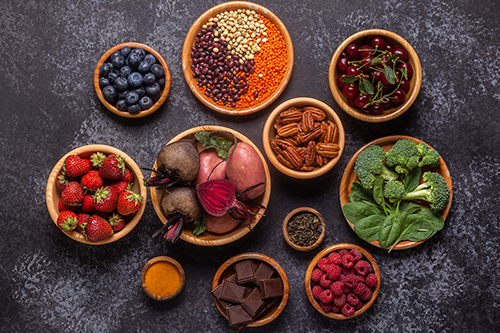Acne is a common skin condition that affects people of all ages, causing frustration and impacting self-confidence. While there are various factors that contribute to acne, including hormones and genetics, the role of nutrition in managing and preventing breakouts should not be overlooked. The foods we eat can either support or disrupt our skin health. In this article, we will explore nutritional tips for achieving acne-free skin. We will discuss the foods you should incorporate into your diet to promote clear skin, as well as the ones you should avoid to minimize acne flare-ups.
Foods to Eat for Acne-Free Skin:
- Antioxidant-Rich Fruits and Vegetables:
Include a variety of antioxidant-rich fruits and vegetables in your diet. These include berries, leafy greens, citrus fruits, bell peppers, and tomatoes. Antioxidants help reduce inflammation, protect against oxidative stress, and support overall skin health. They can help combat acne-causing bacteria and promote a clearer complexion.
- Omega-3 Fatty Acids:
Incorporate foods rich in omega-3 fatty acids, such as fatty fish (salmon, mackerel, sardines), walnuts, flaxseeds, and chia seeds. Omega-3 fatty acids have anti-inflammatory properties that can help reduce acne-related inflammation and redness. They also support healthy cell membranes, aiding in overall skin health.
- Probiotic-Rich Foods:
Include probiotic-rich foods in your diet to support a healthy gut microbiome. Yogurt, kefir, sauerkraut, kimchi, and other fermented foods contain beneficial bacteria that can help balance gut health. A healthy gut microbiome is linked to better skin health and a reduced risk of acne.
- Zinc-Rich Foods:
Zinc plays a vital role in wound healing and reducing inflammation, making it beneficial for acne-prone skin. Include zinc-rich foods such as oysters, pumpkin seeds, legumes, and whole grains in your diet. If needed, consult with a healthcare professional about adding a zinc supplement to your routine.
- Green Tea:
Green tea is rich in antioxidants and has anti-inflammatory properties. It may help reduce sebum production, inhibit acne-causing bacteria, and soothe inflammation. Enjoy a cup of green tea daily or incorporate it into your skincare routine as a topical treatment.
Foods to Avoid for Acne-Prone Skin:
- High Glycemic Index (GI) Foods:
Limit your consumption of high glycemic index foods, which can cause spikes in blood sugar levels. These include sugary snacks, white bread, white rice, and processed cereals. High glycemic index foods may contribute to acne development by increasing insulin levels and promoting inflammation.
- Dairy Products:
Some studies suggest a link between dairy consumption and acne. Dairy products contain hormones and growth factors that may influence the production of sebum and trigger acne breakouts in certain individuals. Consider reducing your intake of milk, cheese, and other dairy products to see if it has an impact on your skin.
- Processed and Fried Foods:
Processed and fried foods are often high in unhealthy fats, refined carbohydrates, and artificial additives. These foods can contribute to inflammation and increase sebum production, potentially worsening acne. Opt for whole, unprocessed foods and choose healthier cooking methods like baking, grilling, or steaming.
- Excessive Sugar and Sweets:
Consuming excessive sugar and sweets can lead to increased insulin levels, inflammation, and potential hormonal imbalances. Limit your intake of sugary beverages, candies, desserts, and processed snacks. Instead, satisfy your sweet cravings with healthier options like fresh fruits or homemade treats using natural sweeteners like honey or maple syrup.
- Caffeine and Alcohol:
Caffeine and alcohol can dehydrate the skin and potentially aggravate acne. Limit your consumption of caffeinated beverages like coffee and energy drinks. When it comes to alcohol, moderation is key. Opt for hydrating alternatives like herbal teas or infused water.
Achieving acne-free skin involves a holistic approach that includes proper skincare, a healthy lifestyle, and balanced nutrition. By incorporating nutrient-rich foods into your diet and avoiding potential acne triggers, you can support clearer, healthier skin. Remember that individual responses to specific foods may vary, and it’s essential to listen to your body and observe how your skin reacts to different dietary changes. Consult with a dermatologist or registered dietitian for personalized advice. Embrace the power of nutrition and the beauty plate to nourish your skin from within and achieve a complexion that radiates confidence and vitality.
